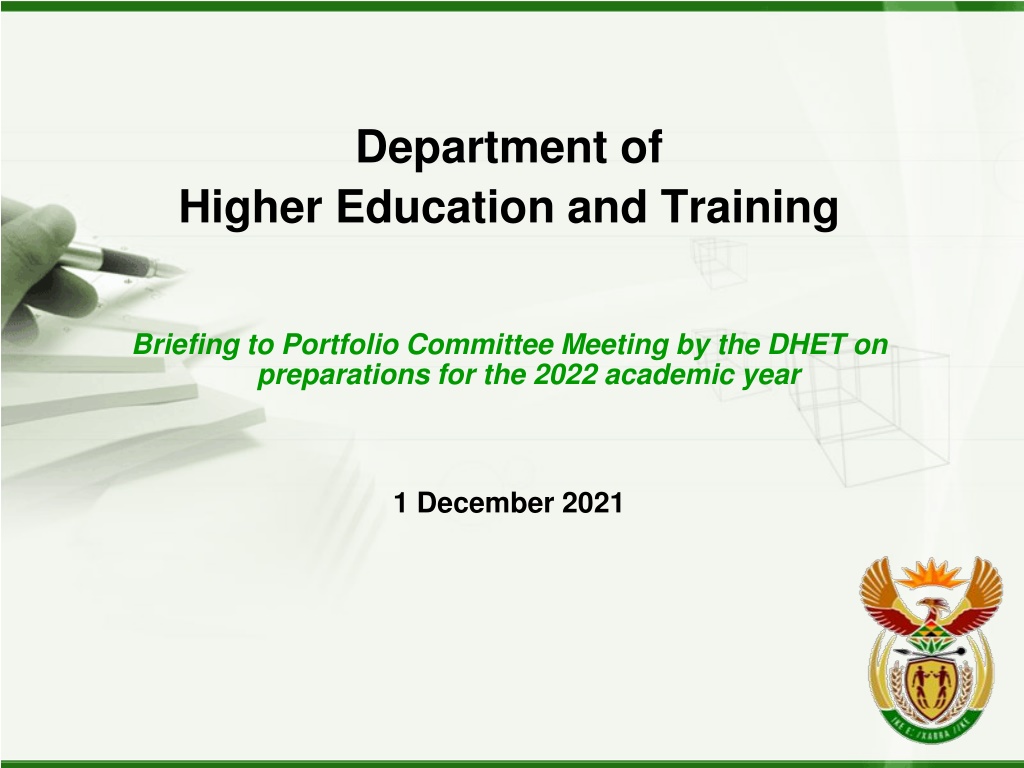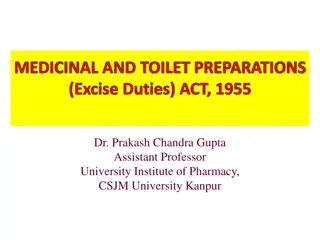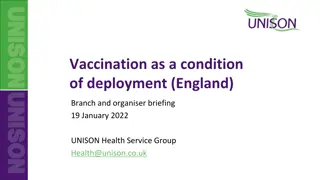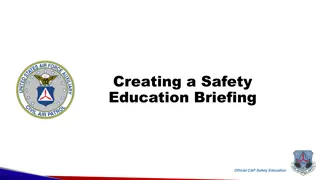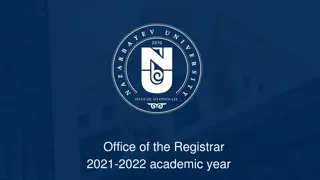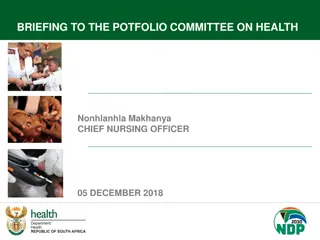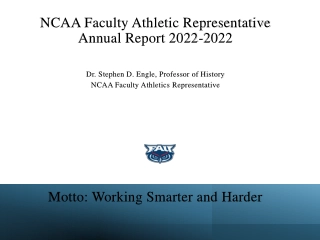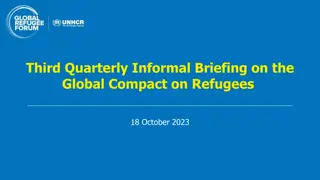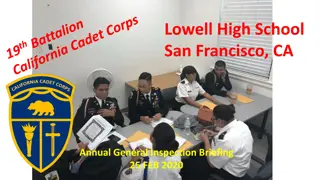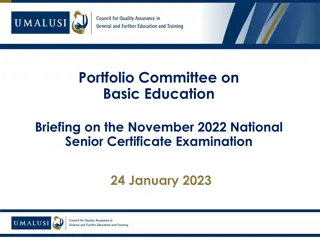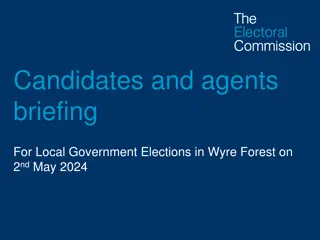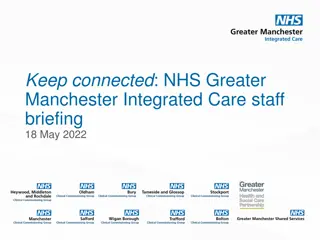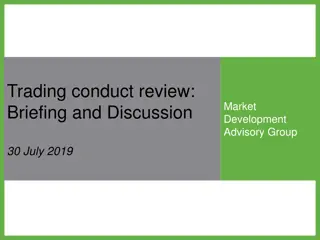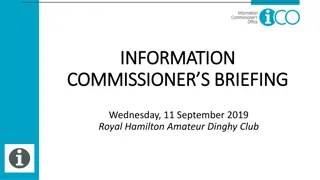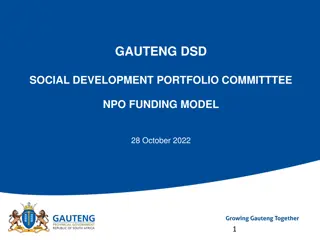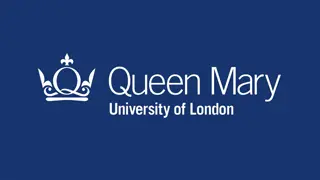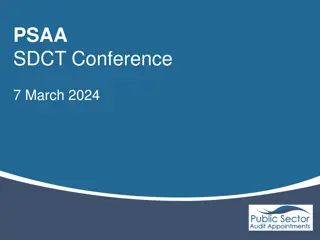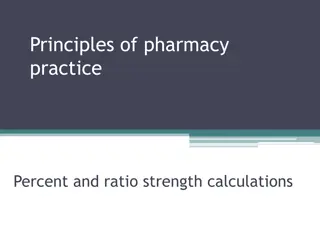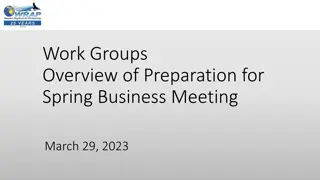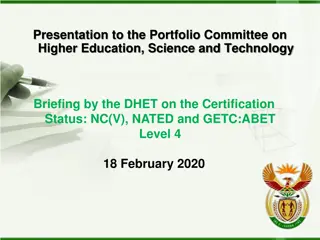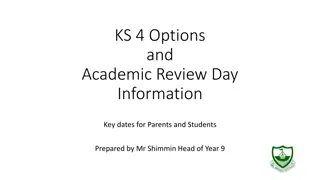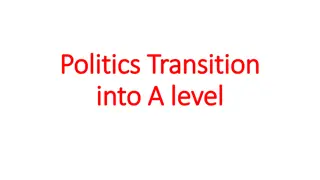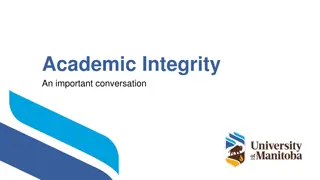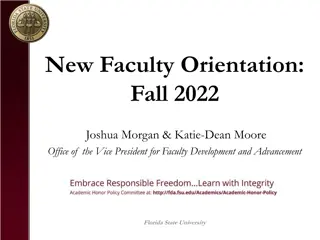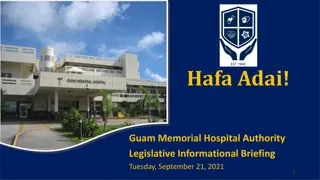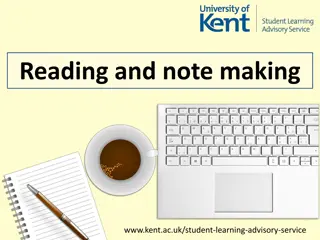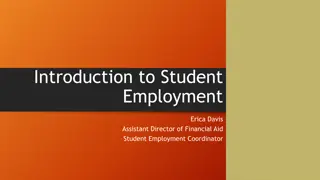DHET Briefing on Preparations for 2022 Academic Year
The Department of Higher Education and Training (DHET) presented preparations for the 2022 academic year to the Portfolio Committee. The briefing covered aspects such as Central Application Clearing House (CACH) for accessing study places, national enrollment targets, and student funding initiatives. The DHET outlined strategies to simplify processes and ensure access to educational opportunities while addressing challenges like the COVID-19 pandemic.
Download Presentation

Please find below an Image/Link to download the presentation.
The content on the website is provided AS IS for your information and personal use only. It may not be sold, licensed, or shared on other websites without obtaining consent from the author. Download presentation by click this link. If you encounter any issues during the download, it is possible that the publisher has removed the file from their server.
E N D
Presentation Transcript
Department of Higher Education and Training Briefing to Portfolio Committee Meeting by the DHET on preparations for the 2022 academic year 1 December 2021
OUTLINE OF THE PRESENTATION Preparations for the 2022 academic year: Universities Technical and Vocational Education and Training Colleges Community Education and Training Colleges 2
CENTRAL APPLICATION CLEARING HOUSE 2022 The Central Application Clearing House (CACH) 2022 will be implemented through the CAS Pilot in collaboration with the Central Application Office. CACH is a sign-up service that will run from 22 January 2022, - the day after the release of the NSC results (21 January 2022) until the end of March 2022. CACH in 2022 will continue to operate as a referral system for applicants who have not been able to access a study place. CACH will provide applicants with access to career development services and where possible, an opportunity to access spaces still available within the PSET system at universities, TVET colleges or in SETA learnership, without having to travel to institutions to try and find a space. This is also to ensure that students do not become victims of bogus institutions. 4
CENTRAL APPLICATION CLEARING HOUSE 2022 CACH service presents the opportunity to simplify the process to take advantage of available opportunities in the PSET sector. By using the CACH service, students will avoid crowding at institutions and assist in complying with the government protocols during the COVID 19 pandemic. During the 2022 CACH service, applicants will be required to register and capture their details including the field of study and programme choice as well as accept and reject offers on the CACH system using various service channels: USSD, WhatsApp Bot, telephone and Web Portal. The success of CACH will depend on institutions using the CACH database to source applicants where spaces are available 5
2022 NATIONAL ENROLMENT TARGETS Overall total enrolments within the public university sector have been projected to be 1 110 361 for the 2022 academic year First time entering enrolments have been projected at 208 299 nationally. First time entering enrolments within scarce skills areas have been projected as follows: - Engineering: 17 085 - Life and Physical Science: 17 584 - Animal Sciences: 985 - Veterinary Sciences: 209 - Human Health: 10 418 - Teacher Education: 22 788 6
STUDENT FUNDING The Ministerial Task Team continues to work to model the costs of different policy options. Phase 1 considered the historical overview of work done in the student financing area and explored the high-level policy options for the future It was proposed that a new policy cannot be introduced for 2022 and it would be necessary to address the shortfall for 2022 through the medium term budget process. Submission were made through the MTBPS process outlining the funding requirements over the 2022 MTEF a R10.1 billion projected shortfall. Further details can only be provided following the conclusion of these engagements within government. 7
STUDENT FUNDING Modelling work and options were presented to Cabinet in November 2021 and work is ongoing for final a report to the Minister in April 2022. The second phase of work requires extensive financial modelling and research into different policy options for a comprehensive student financial aid model incorporating support for all students in need (including so-called "missing middle" students) and post-graduate students. NSFAS has developed a first draft of the Guidelines for University and TVET College students for the 2022 academic year. Extensive consultations with the Department and sectors were conducted. Guidelines will be finalised following the conclusion of all consultations with various stakeholders for recommendation to Minister. 8
2022 REGISTRATION PREPARATIONS As part of the Department s normal process to work with the sector to prepare for the upcoming academic year s registration process, the Department will be meeting with University Registrars, Finance Executives, South African Union of Students and the National Student Financial Aid Scheme (NSFAS) in January 2022. Consultations with stakeholders, including national student leadership on the NSFAS Guidelines for 2022 have already taken place. Further consultation may be necessary in early 2022 before the start of the academic year. The Department will coordinate the briefings of the Minister to Higher Education Stakeholder on readiness of the Department and the sector for the start of the academic year. 9
TEACHING AND LEARNING 2021 continued to be challenging for universities given the continued COVID-19 pandemic and the continuation of blended learning It is anticipated, however, that the 2022 academic year will not be affected by the same delays as in 2021. The Department continued to monitor institutions in terms of COVID health and safety issues and teaching and learning. Work has been initiated with the CHE for more comprehensive work to understand the effect of the pandemic on university education and changes to teaching and learning. The Department issued Guidelines in March 2021 to guide the sector in relation to the pandemic and worked closely with Higher Health throughout the academic year on a range of issues. The Department will work again with the sector, the CHE and Higher Health to develop new guidelines for the 2022 academic year, which will also be informed by changes to the pandemic. 10
2022 ACADEMIC CALENDAR The 2022 academic calendar was approved on 27 September by the Acting Director-General and dispatched to TVET colleges and other stakeholders on 28 September 2021 as it is the norm to dispatch it by 30 September each year, at the latest. (Annexure A) The approved Calendar is also published through the Departmental website. Principles driving the 2022 Academic Calendar All the lecturing staff will commence with their work on 17 January 2022 with a total service days of 201. Classes will commence on 24 January 2022 for both the National Certificate Vocational [NC(V)] and the Report 191 Business Utility Studies. Due to the Report 191 Natural Sciences Studies Trimester 3 of the 2021 academic year only being finalised in the first quarter of 2022, lecturers and students will commence their work and revision classes in preparation for the examinations on 17 January 2022. The 2022 academic year will only have two trimesters for the Report 191 Natural Sciences Studies. 12
2022 ACADEMIC CALENDAR (CONTINUE) The rest of the 2022 academic year is anticipated to run smoothly resulting in a total of 170 lecturing days for the NC(V) programme, 154 lecturing days for the Report 191 Business and Utility Studies, and 141 lecturing days for the Report 191 Natural Sciences Studies of which 10 lecturing days will be spent on revision work in preparation of the Trimester 3 examinations for the 2021 academic year. The Internal Examinations may be conducted either in the second or third term, for a maximum of fourteen days for NC (V) candidates. Lecturing staff service days when no students are on campus MUST be utilised for lesson planning, assessment planning, subjects and faculty meetings, lecturer training, work integrated learning and work-based experience, and administrative work. The NC (V) Supplementary Examinations should not impede teaching contact time. No deviation from the approved calendar is allowed without prior approval by the Director-General of the Department of Higher Education and Training. 13
CURRICULUM REVIEWS From January 2021 the Directorate: Programmes and Qualifications have started implementing revised curricula of 38 subjects which were approved in 2020. 24 more subjects which were revised in 2020 have been submitted to QCTO for quality assurance, these are earmarked for implementation starting from 2022. An additional stream to the NCV: IT & CS programme which focuses on Robotics was quality assured and approved by Umalusi and currently planning for its implementation in 2023. 14
ALIGNING TVET PROGRAMMES WITH INDUSTRY NEEDS The proposed phase out of NATED N1-N3 submitted to Minister in July 2021 for approval (awaiting Minister s feedback). Task Team to oversee phase out of NATED N1-N3 tentatively established and ToRs submitted for Minister s approval. NATED N4 N6 Engineering programmes currently being redesigned in a process lead by QCTO, envisaged implementation in 2024. 15
TVET LECTURER CAPACITY BUILDING Engagements are currently underway with Huawei to establish HUAWEI ICT Academies at TVET colleges. Focus is on artificial intelligence, Big data, internet of things. Training programmes for Electrical and Mechanical Engineering lecturers to become Master trainers is currently underway at Ekurhuleni East TVET College in collaboration with University of Stuttgart (Germany). 16
TEACHING AND LEARNING MONITORING 2022 Academic calendar finalised with two Trimesters in 2022 for NATED Engineering Studies. Monitoring/Oversight implementation to be conducted in November 2021. of Teaching and Learning Plans A new dimension to monitor the offering of digital skills programmes has been integrated in the Teaching and Learning Plan monitoring process. 17
MONITORING IMPLEMENTATION OF SOP ON TVET ENROLMENT Application phase for new students commenced with advocacy during TVET month in August. First closing date for applications was 30 September 2021 and second date is end of October. By end of November, before college closure in December, selection and admission of new applicants as well re-admission of returning students should be concluded. The 2022 intake should be provisionally registered and this registration will be confirmed during the registration periods allocated in 2022. Regional teams will deploy to campuses to monitor implementation as well as student satisfaction. Period October 2021 February 2022. Monitoring by the Oversight Committee (national structure) will be conducted in November 2021 and February 2022. 18
EXAMINATIONS AND ASSESSMENT The Management plans for the conduct, monitoring and administration for 2022 examinations are in the process of development and will be distributed to all colleges after alignment with the quality assurance bodies management plans. The 2022 draft time tables will be finalised and to colleges by end of November 2021. The State of readiness and conduct of examinations monitoring for the deferred Trimester 3 will be conducted across six regions between February and March 2022. Training on policy compliance targeting identified non-compliant colleges scheduled to take place between April to June 2022. 19
MANAGEMENT AND GOVERNANCE: COLLEGES 2022/23 PLANNING Summary Analysis for the Ministerial programme: The total headcount enrolment provided by the Indicative funding Grid is 504,422. The total planned enrolment by colleges as in their Annual Performance Plan is for 2022 is 519, 490. The variance between the projected headcount provided by the indicative FG and the APP is 15, 068. Out of the 15,068 variance (balance of over and under-enrolment), 8,163 is accounted by the self funded students. Colleges will fund 6,844 (an over-enrolment of 61 students has not yet been fully responded by colleges) of the projected enrolment of students from their reserve. The amount which is not yet accounted by colleges, i.e. colleges not responding as to where they would fund their over-enrolment, 61 is less than 1% (0.012%) of the headcount enrolment provided by the Indicative Funding Grid. 20
DEVELOPMENT OF ENTREPRENEURIAL SKILLS The development of entrepreneurial skills, as well as the focus on digital training is aimed at improving the quality of provisioning in TVET colleges, as well as strengthening exit support to graduates for self-employment in the context of a poor labour-absorptive capacity in the economy. Service delivery for students with disabilities will be addressed through the establishment of DSUs in four colleges, with the aim of establishing six centres over a ten-year period. Similarly, based on the need for TVET college students to be actively engaged in the economy, either through employment in the labour market or through self-employment, more entrepreneurship hubs will be established over the five-year period with the aim of growing these to 25 over a ten-year period. 21
2022 TARGETS 2022-2023 TARGET ANNUAL TARGET Three-year enrolment plan with differentiation in programme enrolment approved Three-year enrolment plan with differentiation in programme enrolment approved by the Director-General by 30 September 2022 Report on the implementation of the framework and guidelines to accommodate students with disabilities approved by the Director-General by 31 March 2023 Additional one TVET college with established DSU to support students with disabilities by 31 March 2023 Model for efficient utilisation of current TVET infrastructure implemented 1 Monitoring report on the implementation of the Framework and guidelines to accommodate students with disabilities approved annually Number of TVET colleges with established DSUs to support students with disabilities Monitoring report on the implementation of a model for efficient utilisation of current TVET infrastructure approved annually Annual report on cooperation agreement with Germany on SAIVCET work approved 2 3 4 A report on cooperation agreement with Germany on SAIVCET work approved by the Director-General by 31 March 2023 5 Period it takes to release examination results to qualifying students Percentage reduction in certification backlog of qualifying students Monitoring report on the Conduct, Management and Administration of TVET college examinations and assessment approved Examination results per cycle for qualifying students released in 40 days from last day of the exams timetable 98% 6 7 Quarterly monitoring reports on the Conduct, Management and Administration of TVET college examinations and assessment approved the Director-General by 31 March 2023 8 22
2022 TARGETS Period it takes to release examination results to qualifying students Examination results per cycle for qualifying students released in 40 days from last day of the exams timetable 98% 9 Percentage reduction in certification backlog of qualifying students Monitoring report on the Conduct, Management and Administration of TVET college examinations and assessment approved 10 Quarterly monitoring reports on the Conduct, Management and Administration of TVET college assessment approved the Director-General by 31 March 2023 11 examinations and Number of TVET college lecturers holding appropriate qualifications supported to acquire professional qualifications annually Percentage compliance of TVET college councils with approved voluntary Governance Standards 250 12 A Voluntary Governance Standard is approved by the TVET College councils by March 31 2023 13 23
2022 TARGETS A monitoring report on the implementation of Institutional maturity model for TVET colleges approved annually A monitoring report on the implementation of the pilot for the institutional maturity model for TVET colleges approved by the Director-General by 31 March 2023 14 Infrastructure Maintenance Plans for TVET Colleges approved TVET Colleges Infrastructure maintenance plans for 2023/24 relating to all sites of delivery approved by the Director-General by 31 March 2023 15 Monitoring report on the implementation of the norms for differentiated infrastructure linked to curriculum delivery approved annually Norms for differentiated infrastructure linked to curriculum delivery implemented 16 Percentage increase in student placement in the workplace for experiential learning per annum A 8% annual increase in the number of students placed in the workplace for experiential learning annually 17 Number of TVET colleges supported to establish entrepreneurship hubs Additional four TVET colleges supported to establish entrepreneurship hubs approved by the Director- General by 31 March 2023 18 Number of new or revised subject curricula for TVET colleges approved 10 new or revised subject curricula for TVET colleges approved by the Director-General for implementation by 31 March 2023 19 Number of TVET programmes with digital skills training integrated 3 additional programmes with integrated digital skills training approved by the Director-General for implementation by 31 March 2023 20 24
2022 ACADEMIC CALENDAR FOR CET COLLEGES Acting Director-General approved the 2022 Academic Calendar on 8 September 2021 and it was distributed to all colleges for implementation Inland CET Colleges will commence academic programme on 12 January to 17 March 2022 and Coastal CET Colleges on 19 January to 17 March 2022 respectively; for the first quarter. Academic staff will commence two days before the start of the academic programme for preparations It is important to note that CET sector academic calendar links with the DBE s calendar. 26
LEARNING AND TEACHING SUPPORT MATERIALS (LTSM) R70 million was put aside in 2021 budget to procure 2022 LTSM The CET Colleges, in line with the LTSM Policy (2017) started procurement of stationary and LTSM in the current year for the 2022 academic year Some CET Colleges will augment LTSM for students dependent on their retrieval of LTSM from students in the current academic year 27
PROGRAMME OFFERINGS The CET Branch is finalising the 2022 National Register of Programmes The 2022 National Register comprises the Programme and Qualification Mix that CET Colleges will be offering in the 2022 academic year All 9 CET Colleges offer the following Programme and Qualification Mix: o Literacy Programmes (AET Levels 1, 2 and 3); o GETC: ABET (NQF Level 1); o Senior Certificate (amended) (NQF Level 4) offered in collaboration with the DBE; o Occupational Skills programmes (accredited part qualifications) offered in collaboration with SETAs, DSI, QCTO and the CIE (Catholic Institute of Education); and o Non-Formal Programmes offered in collaboration with DVV International (the German Institute for Adult Education) and local NGOs. 28
PROGRAMME OFFERINGS Skills and Non-formal Programmes are offered in response to demand, taking into consideration Local Economic Drivers, local industry demands and government priorities. The Branch is collaborating with Small Enterprise Development Agency (SEDA) to introduce Entrepreneurship Programmes in colleges with the final objective of stimulating economic activity in communities. A project for the establishment of ICT infrastructure in the 54 pilot centres, funded by the W&R SETA, is currently underway, This will enable the sector to respond to 4IR demands while providing skills to enhance employment and entrepreneurship. The Branch is finalising processes for the implementation of two new qualifications: the NASCA (NQF 4) and the GETCA (NQF 1), designed to articulate with each other and create learning pathways to further education for adults. 29
COMPLIANCE WITH COVID-19 REGULATIONS The National Treasury approved R45,7 million to be transferred to CET colleges during the 2021/22 financial year as an earmarked allocation for procurement of cleaning services for learning sites The National Treasury approved the transfer of R10 million to Higher Health. The Department in collaboration with Higher Health (provide current status and future programme for 2022) to secure screeners and psychosocial support for CET Colleges HWSETA provided an additional R8,975,000.00 to Higher Health dedicated for CET programmes The Department monitors compliance and impact through administering of a monthly questionnaire. Based on the responses, the Department conducts a detailed analysis to determine interventions needed by the sector 30
FUNDING MECHANISM FOR CET COLLEGES The National Norms and Standards for Funding (NNSF) Community Education and Training (CET) Colleges was published in March 2020 and implemented with effect from 1 April 2020 The NNSF-CET Colleges provides a mechanism for distribution of funds to colleges. In terms of par. 86 of the NNSF CET Colleges, the Department has the responsibility to: Provide colleges with the preliminary budget allocations for planning purpose by November each year. Confirmation of preliminary budget estimated was made on 2 November 2021. o Provide colleges with the final budget by 31 March each year. This will be done by 31 March 2022. o Three tranches worth R153 million have been transferred to CET colleges. The third transfer was made in October 2021 and the final tranche (R51.1 million) will be transferred in January 2022. 31
2022 PRELIMINARY BUDGET ESTIMATES The following 2022 preliminary budget estimates (i.e. subsidy allocation) was communicated to CET colleges on 2 November 2021 The 2022 final budget will be communicated to CET colleges in March 2022, once final allocation letter is received from Office of the CFO Proportion of Funding (aligned to the 2017 ULR) 10% Head Office (after minimum allocation and applying URL 3 299 000 CLC (after minimum allocation 6 905 000 2022 Preliminary Budget Estimates 21 766 000 CET College Total 2022/23 allocation Cleaning Services Earmarked Funds 21 766 000 8 302 000 3 260 000 EC 7% 15 238 000 5 657 000 2 283 000 3 299 000 3 999 000 15 238 000 FS 28% 60 355 000 9 549 000 9 457 000 17 092 000 24 257 000 60 355 000 GP 22% 45 794 000 9 124 000 7 173 000 3 299 000 26 198 000 45 794 000 KZN 8% 17 414 000 7 542 000 2 610 000 4 042 000 3 220 000 17 414 000 LP 8% 17 412 000 5 413 000 2 610 000 3 299 000 6 090 000 17 412 000 MP 2% 9 199 000 2 646 000 652 000 3 299 000 2 602 000 9 199 000 NC 6% 13 059 000 4 136 000 1 957 000 4 306 000 2 660 000 13 059 000 NW 8% 17 414 000 2 220 000 2 610 000 3 361 000 9 223 000 17 414 000 WC Total 100% 217 651 000 54 589 000 32 612 000 45 296 000 85 154 000 217 651 000
MONITORING AND SUPPORT The Department (Regional Office and Head Office) planned to monitor the registration process in CLCs and to provide the necessary support. Focus areas for this process are: o Opening and registration process o Advocacy and community involvement o IT infrastructure and connectivity o Implementation of the Programme and Qualification Mix o LTSM o CLC Budget o Quality provision While the current monitoring process has been focusing on the readiness of CLCs to operate, this is a process that continues throughout the academic year to ensure quality provision. 33
